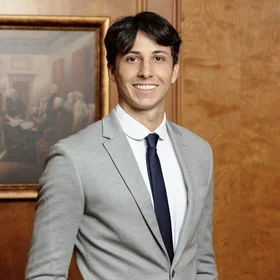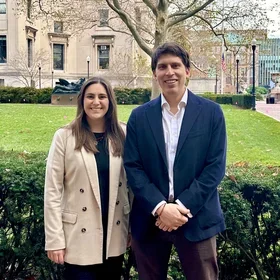Anna Short majored in Government at Georgetown, and after graduating, knew she wanted to learn more about the intersection of tech and business. She enrolled in Columbia’s Technology Management program, where she has been combining these interests, as well as learning valuable leadership, team building, and communication skills. This fall, she will start a new role in federal consulting with a leading management consultancy.
Tell us about your career path and what led you to Columbia’s Technology Management degree program.
I was a government major in my undergraduate program at Georgetown, and I was writing a paper on drone use in the Middle East. I thought, “Why couldn’t the technology be improved to be more moral?” I was minoring in Computer Science at the time, and I looked to the technology side to find the answer. I finished the paper, but the question stayed with me. After I graduated, I knew I wanted to learn more about the intersection of tech and business, as well as leadership—that’s how I ended up in Columbia’s Technology Management program as a full-time online student.
How would you describe your experience in the program?
My Digital Strategy class with Professor Douglas Scherer was the first class I had in the program, and it is hard not to be excited about the material when he is that passionate. Everyone—students, teachers—in the program is so passionate about what they do, and everyone is in different fields: from digital marketing to software engineering. That creates a really dynamic environment, so that when we’re working together, everyone contributes uniquely.
Do any classes or professors stand out to you?
In my Behavioral Challenges in Technology Management class with Professor O’Connell, there was a great deal of teamwork involved. I’ve worked on group projects in the past, but nothing at that level of cooperation. The idea was to balance the aspects of working together on a team with implementation, as we would have to in a real world setting. Often, people with tech skills can lack communication skills, and this class allowed us to build those. I became very reflective on my own actions, and how they were affecting others. Before that class, I didn’t even know that was part of the program—that level of examination on emotional intelligence. I found it very refreshing and eye-opening to learn what kind of personality I had and how I worked in a team. Taking this class at the beginning of the program helped me establish a crucial baseline to move forward from.
My new role, at a leading management consultancy, will involve implementing artificial intelligence and machine learning in federal agencies. During my last round of interviews for the role, I used an example from a case study question from class, where we discussed a failing IT department and how to use consultants to implement a working system.
Where do you see yourself after graduating?
I’m starting a job in federal consulting this August with a leading management consultancy. My role will involve implementing artificial intelligence and machine learning in federal agencies. During my last round of interviews for the role, I used an example from a case study question from class where we discussed a failing IT department and how to use consultants to implement a working system. My final project in class surrounded the federal side of technology. So you can see how my professional and personal interests helped define my path in the Technology Management program and vice versa.
What kind of impact would you like to make in your career?
Technology is an exciting, but nerve-wracking field. We’re constantly walking a fine line ethically between advancement and morality. I believe in using technology in a moral way that helps people and makes their lives better. Just because we can advance a technology in such a way doesn’t necessarily mean we should, and it’s important that all the people involved in that advancement are moral, as well as proficient. One of the biggest blindspots in technology advancement today is being so caught up in the positives of what can be done that you forget to consider the negatives.
What advice do you have for future students in the program?
My best advice is to connect with the people around you. Utilize them as resources, see them as people who can become mentors, and study them as a better way to look at leadership. Connect with your professors. They genuinely care about your professional development; they’re not just there to give a lecture. They will stay in touch with you if you let them—through Linkedin, or even just talking after class. Connect with your TAs. They’re so welcoming and they helped me so much. I can’t say enough good things about them. Connect with your classmates. Some of my peers had years of experience in the technology industry. They had so much advice to give, and asking them questions, hearing what they had to say in class helped me to find additional opportunities.
Learn more about the M.S. in Technology Management program.


